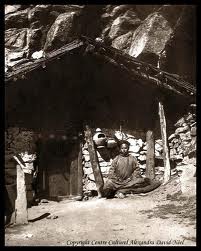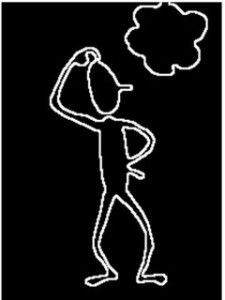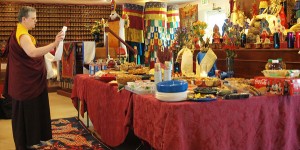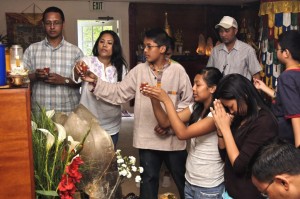The following is an excerpt from a teaching by Jetsunma Ahkon Lhamo called “Why P’howa?”
It is not foreign to our nature, and it is also not separate from the goal that we wish to achieve by practicing in this way, for us to give rise to the great Bodhicitta, or the great compassion. The way that that is done on the Buddhist path is to consider that our own goals and the goals of sentient beings are indistinguishable, that they are nondual. That is to say that our goal to practice in order to achieve liberation, is inseparable from the goal of sentient beings. They also have the goal of practicing in order to achieve liberation. Not all of them know it, in the same way that some of you don’t know it either. You may think you know it, or you may know that you don’t know it, but many of you are still at the party, not growing out of the party, not grown up and looking back and saying “Oh, that won’t do me much good.”
You remember that situation that you found yourself in as you were growing up? When you were a young person you had a few knockdown drag out parties, didn’t you? I mean the kind where, at some point in your life, you probably got drunk. Nobody makes a sound, like “Drunk? What is that?” At some point in your life you probably were out of control, just party down, not thinking straight, doing things that were compulsive and obsessive and not appropriate and not healthy for you, not good for your well-being—unthinking, deluded things. This is something that we have all experienced, but particularly in the case of when we were younger, we would party hearty. And if you think about it, if any of you have done that, and I’m sure that one or two of you have, you may remember that once you’ve partied hearty, there was a period of regret afterwards, and that was primarily the next day. Of course the, how shall I say, the cure for that is, of course, prostrations to the porcelain god; and with all of that, one comes to understand that one is literally destroying oneself, that there is no hope for happiness from doing that to oneself. After doing that repeatedly, we tend to grow up after a while. We tend to be unwilling to put ourselves through that kind of stuff again.
So that happens to us spiritually too. We go through the same compulsive obsessive behavior with no good result. And at some point, either through our own good fortune, through our own gathering together of merit which causes literally a kind of smarts arising in the mind, or through the instruction of our teacher, we can begin to realize that what we are doing makes no sense. It simply makes no sense. It is destructive. It is painful, and it is not pleasant. So that is the stage in which we find ourselves turning our mind towards Dharma.
What we have to realize in order to give rise to the compassion, to the great Bodhicitta, is that this is true of all of us, not just you. If you have come to this realization, that it’s time to turn the mind towards Dharma, then what of those who have not yet come to that realization? They are still putting themselves through that. They are still acting in a destructive way that disintegrates their spiritual strength. They are acting in such a way that literally brings them suffering. What of them? Perhaps you have heard the good word, but what of them? Who will help them? And so we develop a sense of compassion.
Copyright © Jetsunma Ahkon Norbu Lhamo All rights reserved







